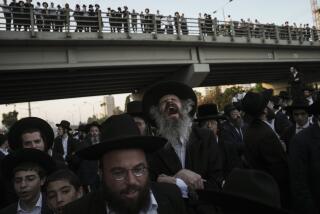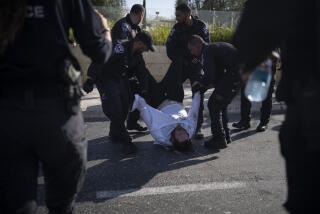Barak Must Confront Power Wielded by Ultra-Orthodox Party
- Share via
JERUSALEM — American Jews concerned about discrimination against Reform and Conservative Judaism in Israel should be paying close attention to Prime Minister-elect Ehud Barak’s emerging coalition. If he proceeds with his intention to include the ultra-Orthodox Shas party, he will squander a rare opportunity to limit the power of Orthodox Judaism and move toward religious pluralism.
Unlike other politicians, Barak ran his election campaign without trying to woo the ultra-Orthodox community or seek the blessings of its rabbis. By challenging their disproportionate political and financial power, he lost ultra-Orthodox voters but won mainstream support for his courage. He is the first prime minister in two decades who owes the ultra-Orthodox nothing.
But after weeks of frustration in trying to form a coalition from among Israel’s fractious political parties, Barak has now decided that Shas is an indispensable partner. The Shas temptation is understandable. The ultra-Orthodox party is dovish on the peace process and will likely support Barak’s territorial concessions. The price for that support, though, will be unbearable. As Israel’s third-largest party, Shas will almost certainly receive four government ministries, making Barak’s government the most ultra-Orthodox-controlled in the country’s history.
Though founded to redress discrimination against Sephardim--Jews of Middle Eastern origin--Shas has evolved into Israel’s leading anti-democratic movement, whose goal is replacing Israeli democracy with theocracy. Shas’ election campaign tried to delegitimize the secular court system, which it outrageously accused of framing party leader Aryeh Deri, recently sentenced to a four-year prison term for bribery. Barak’s precondition for accepting Shas as a coalition partner was that Deri resign as party head, which he has done.
The problem, though, isn’t Deri but Shas itself. No other party has been as successful in drawing hundreds of thousands of nonfundamentalist Israelis into the ultra-Orthodox electoral camp. Shas began with four parliamentary seats in 1984; today it has 17, only two less than the Likud, which led the former government. Shas leaders boast they will become the second-largest party in the next elections.
Shas is the great anomaly of Israeli politics. Its leadership is ultra-Orthodox, while its voters are largely traditionalist but not fundamentalist. The party appeals to a longing among Sephardim for a spiritual intactness lost in their migration to modern Israel, and to ethnic rage at the humiliations they suffered in the state’s early years. Crucially, Shas also appeals to economic interest: Its government-subsidized educational and social projects support poor Sephardim left behind in Israel’s transition to a free-market economy. To maintain its fundamentalist revolution, Shas desperately needs access to state funding, for which it will support any government, left or right.
Continued state funding for Shas’ summer camps and hot lunch programs and youth clubs will increase the number of voters indebted to the party. While social benefits alone hardly explain Shas’ charisma, they substantially widen the party’s reach.
Barak needs to reject Shas’ fundamentalist leadership while embracing its nonfundamentalist voters. He must replace the party’s state-within-a-state with government-sponsored educational and job-training programs for poor Israelis. Previous governments favored special interest groups like kibbutzniks and West Bank settlers. Barak’s government should champion the Sephardi working class.
Barak’s coalition options aren’t easy. He cannot form a minority government based on support from Arab parties, whose loyalty to the state is mistrusted by many Jews. His far better option is to try again to bridge ideological differences with the Likud, even if that means slowing the pace of the peace process. The message of this election is that Israeli democracy is in danger. Confronting ultra-Orthodox power can no longer be deferred by other considerations, including the peace process.
The future of Shas shouldn’t be a matter of concern only for Israelis but also for American Jews, whose emotional connection with the Jewish state has been strained by Orthodox domination of its religious life. In recent years, Shas led the campaign against legitimizing the Reform and Conservative movements, which the party has labeled “destroyers of Judaism.” In parliament, Shas has been far less concerned with social than religious issues, like insuring the rejection of non-Orthodox conversions to Judaism.
Israeli society is now intensely debating Shas’ place in government. Until now, American Jewish concerns haven’t been heard in that debate. Barak should be made aware of the price Israel will pay in American Jewish alienation for the empowerment of Shas. Accommodating the fundamentalists will not only damage democracy but Israel’s status as spiritual homeland of the entire Jewish people.
More to Read
Sign up for Essential California
The most important California stories and recommendations in your inbox every morning.
You may occasionally receive promotional content from the Los Angeles Times.













